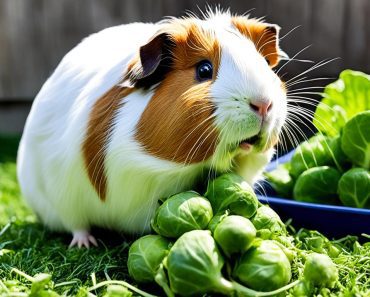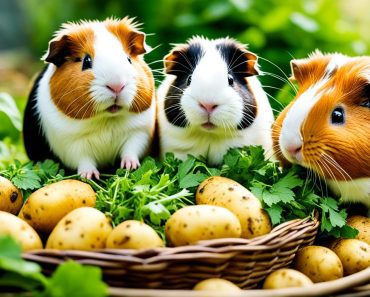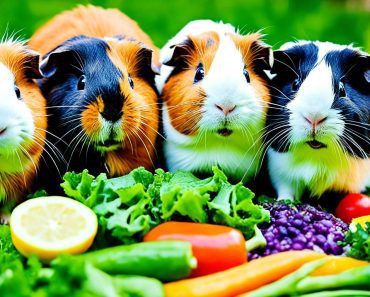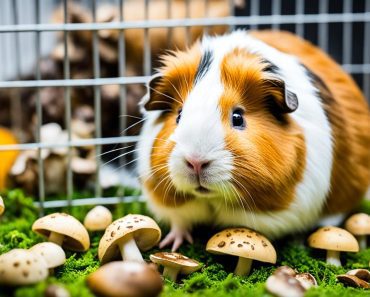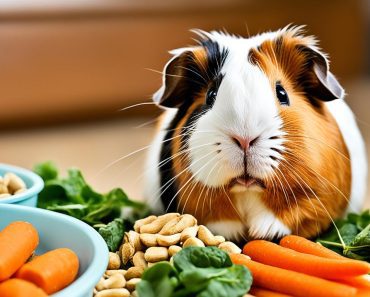As a responsible guinea pig owner, I understand the importance of providing a balanced diet for my furry friend. While it’s tempting to share our favorite foods with guinea pigs, it’s essential to know which foods are safe and suitable for their delicate digestive systems. One common question I often come across is, “Can guinea pigs eat grapes?” Let’s dive into this topic and explore the safe feeding tips for guinea pigs.
Grapes can be a fun and tasty treat for guinea pigs, but we need to be cautious when including them in their diet. Unlike some other animals, guinea pigs can enjoy grapes without any toxic concerns. In fact, grapes contain beneficial antioxidants, such as quercetin, resveratrol, and polyphenols, which can provide potential health benefits.
It’s important to keep in mind that while grapes have some nutritional value, they should be given to guinea pigs in moderation due to their high sugar content. As herbivores, guinea pigs thrive on a high-fiber, low-sugar diet. Fruits, including grapes, should only make up around 5% of their total food intake. This ensures that guinea pigs receive the necessary nutrients without risking obesity or gastrointestinal issues.
I always make sure to remove the seeds from grapes or opt for seedless varieties to prevent any choking hazards. Additionally, consulting a veterinarian for guidance on a balanced guinea pig diet is crucial. They can help determine the appropriate portion size and frequency of treating our guinea pigs with grapes or any other fruits.
Can Guinea Pigs Eat Grapes? Yes, as long as it’s properly served.
- Grapes can be given to guinea pigs as a treat, but moderation is key due to their high sugar content.
- Grapes contain antioxidants that may provide health benefits for guinea pigs.
- Fruits should only make up 5% of a guinea pig’s diet, with the majority being high-fiber, low-sugar foods.
- Always remove the seeds from grapes or choose seedless varieties to prevent choking hazards.
- Consult a veterinarian for guidance on a balanced guinea pig diet and the appropriate portion size for treating with grapes or other fruits.
Are Grapes Good for Guinea Pigs?
Grapes can provide several benefits for guinea pigs due to their unique nutritional composition. These small fruits are packed with antioxidants, including compounds like quercetin, resveratrol, and polyphenols. These antioxidants play a crucial role in protecting guinea pigs against certain health conditions and may have anti-inflammatory effects.
In addition to their antioxidants, grapes are also a great source of hydration for guinea pigs. These fruits contain high amounts of water, which can help keep our furry friends properly hydrated and maintain their optimal well-being.
Furthermore, grapes are rich in vitamin C, an essential nutrient that guinea pigs cannot produce on their own. Vitamin C plays a crucial role in maintaining their overall health, as it supports their immune system and aids in the absorption of other vital nutrients.
While the potential benefits of grapes for guinea pigs are clear, it’s important to note that the exact amount needed for guinea pigs to experience these effects is still unclear.
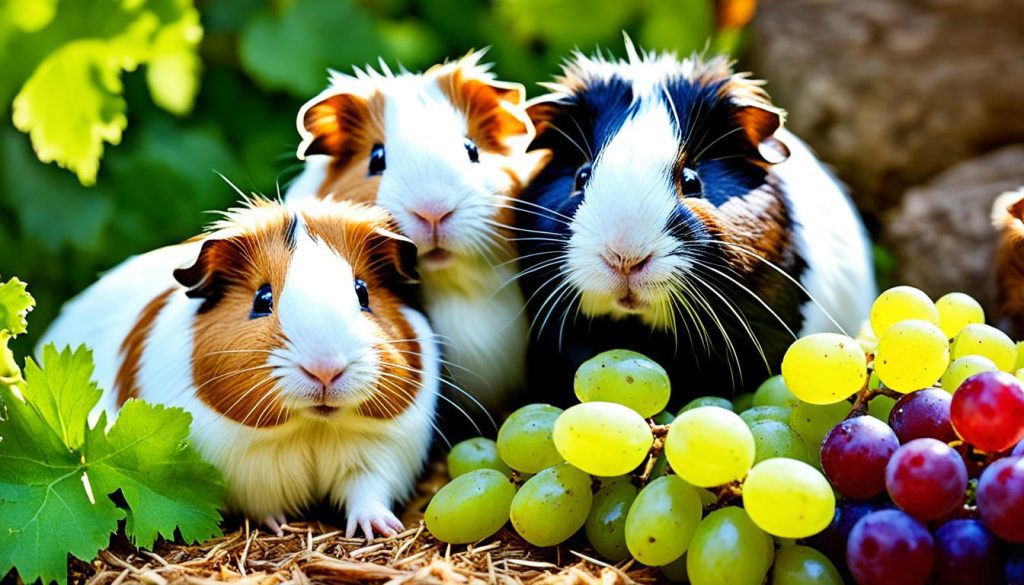
Can Grapes Be Bad for Guinea Pigs?
While grapes can be a safe treat for guinea pigs, it’s important to be mindful of the risks associated with feeding them to your furry friend. Grapes contain high amounts of sugar, which can contribute to guinea pig obesity and potentially disrupt their gastrointestinal stability.
Excessive consumption of grapes, with their high sugar content, can lead to weight gain and an increased risk of obesity in guinea pigs. Being overweight puts them at a higher risk of various health issues, including heart disease, joint problems, and decreased lifespan. It’s crucial to maintain a balanced diet for your guinea pig and ensure that the majority of their food consists of high-fiber, low-sugar options.
Additionally, the sugar content in grapes can also lead to gastrointestinal issues in guinea pigs. Their delicate digestive systems may struggle to process the high sugar content, which can result in diarrhea, bloating, and discomfort. Guinea pigs are herbivores and have a unique gastrointestinal system that is optimized for processing high-fiber foods. Feeding them too many simple carbohydrates, like those found in grapes, can disrupt their digestive balance and cause unnecessary distress.
To prioritize the overall health of your guinea pig, it’s essential to limit treats like grapes and incorporate a variety of vegetables and hay into their diet. While grapes can be enjoyed in moderation, it’s crucial to monitor their intake and ensure they are not being overfed with sugary treats. Consulting with a veterinarian is always recommended to establish a balanced diet plan that meets your guinea pig’s specific nutritional needs.
| Risks of Feeding Grapes to Guinea Pigs | Sugar Content | Guinea Pig Obesity | Gastrointestinal Issues |
|---|---|---|---|
| High sugar content in grapes can lead to obesity in guinea pigs. | Grapes contain a significant amount of sugar which can contribute to obesity. | Excessive consumption of grapes can disrupt a guinea pig’s gastrointestinal stability. | The high sugar content in grapes can lead to digestive issues, including diarrhea and bloating. |
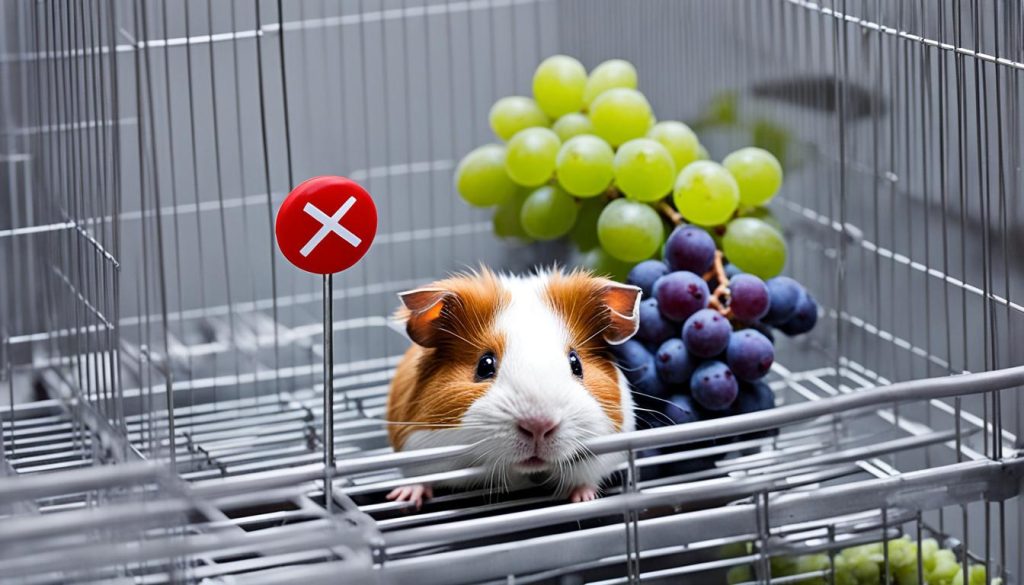
Despite the potential risks, it’s important to remember that each guinea pig is unique, and their tolerance for grapes may vary. Some guinea pigs may be more sensitive to sugar and may experience adverse effects even with moderate grape consumption. It’s crucial to observe your guinea pig’s behavior and overall health when introducing any new food, including grapes.
Remember, moderation is key when it comes to feeding grapes to your guinea pig. Prioritize a balanced diet that includes a variety of vegetables, hay, and limited fruit treats, ensuring the overall health and well-being of your furry friend.
Can Guinea Pigs Be Allergic to Grapes?
Although it is uncommon, guinea pigs can develop allergies, including allergies to grapes. Allergic reactions can vary in severity, ranging from mild symptoms such as swelling, hives, or diarrhea to more severe reactions that can cause breathing difficulties. If you notice any signs of respiratory distress, it is crucial to seek immediate veterinary care.
Introducing grapes too quickly or feeding them in excessive amounts can also lead to gastrointestinal upset in guinea pigs. This can manifest as diarrhea or other digestive issues. To minimize the chances of allergic reactions or digestive problems, it is important to introduce any new food, including grapes, slowly and in small quantities.
As a guinea pig owner, it is vital to pay close attention to your pet’s behavior and any changes in their health after introducing grapes or any other new food. If you notice any adverse reactions, it is best to discontinue the food and consult with a veterinarian for further guidance.
Remember, each guinea pig is unique, and while some may enjoy grapes without any issues, others may have sensitivities or allergies. Always monitor your guinea pig’s reactions and tailor their diet accordingly to ensure their well-being.
Can Guinea Pigs Eat Grape Seeds?
Guinea pigs should not consume grape seeds, as they can pose a choking hazard. While grape seeds contain beneficial antioxidants, it is best to feed guinea pigs seedless grapes or remove the seeds before offering them as a treat.
The Choking Hazards of Grape Seeds
Grape seeds are small and round, making them easy for guinea pigs to accidentally swallow. Their size and shape can cause blockages in the guinea pig’s throat, leading to choking or respiratory distress. To ensure the safety of your furry friend, it is important to remove grape seeds before serving grapes to them.
Removing Grape Seeds for Guinea Pigs
When preparing grapes for your guinea pig, follow these steps to remove the seeds:
- Wash the grapes thoroughly to remove any dirt or pesticide residue.
- Cut the grapes in half using a sharp knife.
- Use the tip of the knife or a small spoon to gently scoop out the seeds from each grape half.
- Ensure that all seeds are completely removed before offering the grapes to your guinea pig.
Removing the seeds will minimize the risk of choking and allow your guinea pig to safely enjoy the sweet flesh of the grape. Always prioritize the safety and well-being of your pet by taking the necessary precautions.
| Pros | Cons |
|---|---|
| Prevents choking hazards | Removal process can be time-consuming |
| Ensures safe enjoyment of grapes | Requires extra care and attention |
| Reduces the risk of respiratory distress | – |
Can Guinea Pigs Eat Grape Jelly?
As a responsible pet owner, it’s essential to be mindful of what we feed our beloved guinea pigs. While grapes themselves can be a safe and enjoyable treat, it’s important to note that grape jelly is not suitable for guinea pigs.
Grape jelly contains additional sugar, processed ingredients, and artificial dyes, which can be harmful to the health of our furry friends. Guinea pigs have sensitive digestive systems and should primarily consume a diet consisting of high-fiber, low-sugar foods.
Feeding grape jelly to guinea pigs can lead to various health issues, including obesity and gastrointestinal problems. Processed foods should be avoided in their diet, as they are true herbivores and thrive on fresh, natural foods.
“Fresh grapes are the safest option for guinea pigs, as they are true herbivores, and processed foods should be avoided in their diet.” – Dr. Emily Rodriguez, DVM
When offering treats to your guinea pig, it’s important to choose healthy, guinea pig-safe options. Fresh fruits and vegetables such as bell peppers, carrots, or cucumbers can be tasty and nutritious alternatives to grape jelly.
Remember to always consult with a veterinarian regarding your guinea pig’s diet to ensure they receive the proper nutrition and to prevent any potential health issues.
| Why Guinea Pigs Should Avoid Grape Jelly | Benefits of Fresh Grapes for Guinea Pigs |
|---|---|
| Grape jelly contains additional sugar, processed ingredients, and artificial dyes, which can be harmful to guinea pigs. | Fresh grapes provide essential hydration and contain antioxidants that contribute to the overall health of guinea pigs. |
| The high sugar content in grape jelly can lead to obesity and gastrointestinal problems in guinea pigs. | Grapes are a natural source of vitamins and minerals, including vitamin C, which is essential for guinea pigs. |
| Processed foods should generally be avoided in a guinea pig’s diet to maintain their overall well-being. | The fiber content in grapes promotes healthy digestion and helps prevent digestive issues in guinea pigs. |
To sum up, grape jelly should be avoided when it comes to feeding our guinea pigs. Opting for fresh grapes instead ensures the safety and well-being of our furry friends. As responsible pet owners, it’s crucial to prioritize their health and provide them with a balanced and nutritious diet.
Can Guinea Pigs Eat Wild Grapes?
When it comes to feeding guinea pigs wild grapes, safety should be the top priority. While wild grapes can be provided as a treat, it’s essential to exercise caution and ensure their quality. Unknown sources of wild grapes may carry potential contamination or pesticides that could harm guinea pigs. To mitigate any risks, it is crucial to wash and inspect grapes thoroughly before offering them to your pet.
Feeding guinea pigs grapes from a personal garden can be a safer option, as long as proper measures are taken. The grapes should be carefully washed, removing any dirt or residue that may be present. Inspecting the grapes for abnormalities such as mold, pests, or signs of damage is also important to ensure the overall safety of the fruit. By following these steps, you can provide wild grapes to your guinea pig while minimizing any potential contamination risks.
Remember, the well-being of your furry friend is paramount. Always prioritize their safety and consult with a veterinarian if you have any concerns or doubts about introducing wild grapes into their diet.
Conclusion
Grapes can be a safe and enjoyable treat for guinea pigs when fed in moderation. They offer potential health benefits due to their antioxidant content and can provide hydration and essential vitamins. However, it is crucial to prioritize a guinea pig’s diet with high-fiber, low-sugar foods and limit fruit treats to maintain their overall health.
Consulting a veterinarian for guidance on a guinea pig’s diet is essential. They can provide personalized recommendations and ensure that the introduction of any new food is done carefully to prevent allergies or digestive issues. Remember, each guinea pig is unique, and their dietary needs may vary, so it’s always best to seek professional advice.
To keep your furry friend happy and healthy, incorporate a variety of safe fruits, including grapes, into their diet while maintaining a balance with other nutritious foods. By following safe feeding practices and monitoring your guinea pig’s overall well-being, you can provide them with a well-balanced diet and ensure their long-term health.

